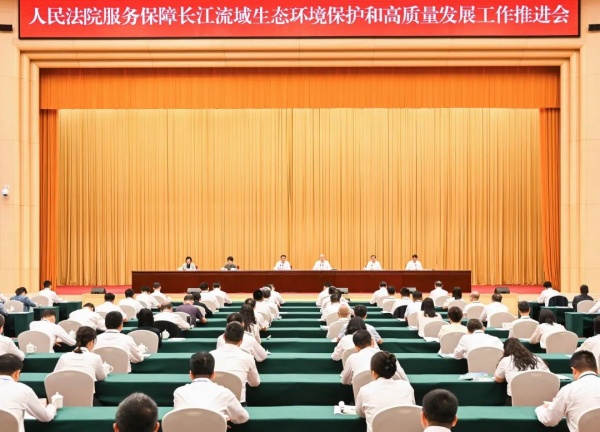Progress lauded in judicial support for Yangtze River protection and high-quality development
A meeting on judicial services for ecological protection and high-quality development in the Yangtze River Basin was held in Southwest China’s Chongqing municipality on May 28.
Senior officials including Yuan Jiajun, secretary of the Communist Party of China Chongqing Municipal Committee; Zhang Jun, president of the Supreme People’s Court (SPC); Guo Fang, vice-minister of ecology and environment; and Chen Min, vice-minister of water resources, attended the meeting and delivered remarks.

A meeting on judicial services for ecological protection and high-quality development in the Yangtze River Basin is held in Southwest China’s Chongqing municipality on May 28. [Photo/court.gov.cn]
The Yangtze River, widely regarded as the "mother river" of China, plays a fundamental role in the country's ecological security and sustainable development. The meeting reviewed the progress in implementing the Yangtze River Protection Law and discussed further measures to strengthen the role of judicial systems in safeguarding the river's ecological environment and supporting coordinated regional growth.
At the event, Yuan emphasized Chongqing’s role as the largest riverside city in the upper Yangtze region, underlining its commitment to green development and the principle of promoting well-coordinated environmental conservation and avoiding excessive development. He highlighted ongoing efforts in carbon reduction, pollution control, and ecological conservation, as well as reforms to enhance judicial protection and law enforcement related to water pollution prevention and ecosystem preservation.
In recent years, courts throughout the Yangtze River Basin have concluded 457,400 first-instance criminal, civil, and administrative cases related to the environment and resources. The SPC has guided the establishment of six environment and resources tribunals, nearly 1,000 specialized adjudicatory organizations, more than 700 judicial protection bases, and over 800 collaborative protection mechanisms involving courts and relevant administrative departments.
Zhang emphasized the responsibility of courts to provide high-quality judicial services for the ecological protection and high-quality development of the Yangtze River Basin. He called for enhanced coordination between judicial and administrative bodies, innovative approaches in adjudication of cases related to the environment and resources, and further integration of legal safeguards into regional development strategies.
Guo highlighted the joint efforts between the Ministry of Ecology and Environment and the SPC in advancing the ecological protection of the Yangtze River, noting significant improvements in water quality and biodiversity. Chen underscored the importance of legal support in water governance and pledged deeper cooperation between water authorities and judicial institutions.
The meeting also featured the release of key updates and guiding case studies by Yang Linping, vice-president of the SPC. Representatives from the Ministry of Water Resources, the National Development and Reform Commission, the Ministry of Agriculture and Rural Affairs, and high courts in provinces along the Yangtze River shared their practices and achievements in this regard.









